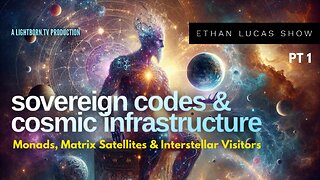Premium Only Content

The Dark Secrets of Isaac Newton - A Hidden Life - Full Documentary
A Complicated Man - Is the Newton-and-the-apple story true? Does anybody really understand the Principia? Was he a nice guy? Sir Isaac Newton's accomplishments border on the uncanny, as does his image in the world of science. With time, the historical Newton receded into the background, overshadowed by the very legacy he helped create. Newton thus metamorphosed into science personified. So what is that legacy? What were those accomplishments? Here, familiarize yourself with Newton's greatest contributions.
Invented the reflecting telescope
The standard telescope of Newton's time, the refracting telescope, was not ideal. Its glass lenses focused the different colors inherent in light at different distances. This resulted, at the edges of any bright objects seen through the telescope, in colored fringes that rendered those objects slightly out of focus. Newton solved the "chromatic aberration" problem by using mirrors instead of lenses. His original reflecting telescope, which he built himself in 1668, was just six inches long. This modest device not only eliminated the colored fringes but magnified whatever it focused on by 40 times, which, as Newton noted at the time, "is more than any 6 foot Tube can do." After presenting his scope to the Royal Society, the then-unknown Newton was proposed for membership; he later served as its president for 24 years, until his death in 1727.
Proposed new theory of light and color
Not long after he donated his telescope to the Royal Society, Newton delivered a paper to that august body about his novel theory of light and colors. Using prisms and his usual very exacting experimental technique, Newton had discovered that sunlight is comprised of all the colors of the rainbow, which could not only be separated but recombined into white light. Though he made his experiments on light as early as 1666, when he was only 24 years old, he didn't publish his classic Optics, which summarized his findings on light and color, until 1704.
Discovered calculus
When Newton began to muse on the problem of the motion of the planets and what kept them in their orbits around the sun, he realized that the mathematics of the day weren't sufficient to the task. Properties such as direction and speed, by their very nature, were in a continuous state of flux, constantly changing with time and exhibiting varying rates of change. So he invented a new branch of mathematics, which he called the fluxions (later known as calculus). Calculus allowed him to draw tangents to curves, determine the lengths of curves, and solve other problems that classical geometry could not help him solve. Interestingly, Newton's masterwork, the Principia, doesn't include the calculus in the form that he'd invented years before, simply because he hadn't yet published anything about it.
Developed three laws of motion
Newton's Principia is difficult to comprehend on two levels, even for experts: in its original form, it is written in Latin, and it uses very challenging mathematics. Yet one thing that comes out very simply and very clearly to all is his three laws of motion:
Law of inertia: Every object persists in its state of rest or uniform motion in a straight line unless it is compelled to change that state by forces impressed upon it.
Law of acceleration: Force is equal to the change in momentum (mV) per change in time. For a constant mass, force equals mass times acceleration, F = ma.
Law of action and reaction: For every action, there is an equal and opposite reaction.
Devised law of universal gravitation
Newton said shortly before his death that it was seeing an apple fall in his mother's garden that set him thinking "that the power of gravity ... was not limited to a certain distance from the earth but that this power must extend much farther than was usually thought. Why not as high as the moon ... and if so that must influence her motion and perhaps retain her in her orbit." This brainstorm (which some scholars suspect Newton may have invented late in life) ultimately led to his law of universal gravitation. The law says that all particles of matter in the universe attract every other particle, that gravitational attraction is a property of all matter. The law explained many things, from the orbits of the planets around the sun to the influence of the moon and sun on the tides. And it held sway as the accepted description of terrestrial and celestial mechanics for almost 200 years—until Einstein came along and rocked the boat with relativity.
Advanced early modern chemistry
Newton spent untold hours of his life practicing alchemy. Like other alchemists, he sought to turn base metals into gold, find a universal cure for disease, and secure the elixir of life, which promised perpetual youth and eternal life.
#history #biography #documentary
-
 20:39
20:39
Seeker Land
26 days agoBest Comedian Reels & Shorts Compilation - Part 1
58 -
 8:40
8:40
MattMorseTV
13 hours ago $4.23 earnedSchumer just KICKED OFF the Left-Wing CIVIL WAR.
7.59K20 -
 21:39
21:39
Nikko Ortiz
2 days agoI Take A North Korean Shooting
9.51K3 -
 1:46:26
1:46:26
The Michelle Moore Show
17 hours ago'The Religion Invasion In the U.S. and the Deep State Agenda' Guest, Mark Taylor: The Michelle Moore Show (Nov 3, 2025)
16.7K21 -
 LIVE
LIVE
TruthStream with Joe and Scott
5 days agoSovereign Codes & Cosmic Infrastructure,Ufo's, UAP's, Monads, Matrix Satellites, Interstellar Visitors, SYRONA #505
196 watching -
 LIVE
LIVE
Lofi Girl
2 years agoSynthwave Radio 🌌 - beats to chill/game to
116 watching -
 5:55:11
5:55:11
MattMorseTV
10 hours ago $83.35 earned🔴Trump's '60 Minutes' INTERVIEW + MUCH MORE.🔴
152K40 -
 2:02:36
2:02:36
Badlands Media
14 hours agoBaseless Conspiracies Ep. 157: Jack the Ripper, the Crash & the Great Disclosure Countdown
31.6K20 -
 2:06:09
2:06:09
Inverted World Live
10 hours agoMysterious Crash at Area 51 | Ep. 134
36.3K13 -
 2:48:59
2:48:59
TimcastIRL
8 hours agoTrump Endorses Cuomo, Says NO COMMIE MAMDANI, Obama REFUSES To Endorse Mamdani | Timcast IRL
271K187